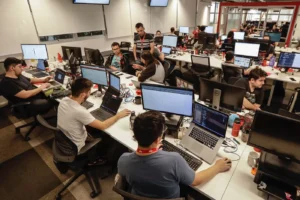Luana Godoi
💻 Product Manager at iFood
How we're learning to make reviews more trustworthy across the entire platform.
Aloha! I'm Luana Godoi, Product Manager at iFood, where I've been working for 9 months — but, in truth, it's been a while since I left the gestational period. 😛
My challenge at iFood since the beginning has been to take care of Reviews, with a greater focus on the Restaurant experience. To better understand this challenge, a first step was taken: Product Discovery.
Through a lot of research, we identified several pain points. One of the most cited by users was: “iFood’s evaluation system is not fair”. But is it easy to resolve this pain, considering that the concept of justice is relative and broad?
The importance of evaluation
The evaluation is a resource provided by iFood to collect the opinions of users who have had real ordering experiences and, thus, provide useful and constructive feedback to partner establishments, promoting a fair and reliable way of using the platform.
Assessment is important because:
- Impacts the consumer experience and their choice criteria;
- Impacts the restaurant experience by improving and valuing its service and products;
- It is one of the factors in the composition of indices and ranking of restaurants on the platform.
Therefore, it is essential that we look carefully and constantly improve our system to make it as fair and reliable as possible.
Assessing (and investigating) our problem
Focus on the problem! We then dive into the issues most cited by restaurants related to justice. One of the most frequent: “there are many false reviews that harm my establishment”.
To understand fake reviews, we take another step: devouring data! We needed to identify patterns to help us define the concept of fake reviews and to think about ways to address the problem.
In addition to looking at internal data, we also carried out benchmarking to find out how the main players that use assessments address this problem. And we went after the biggest reviews site in the world. Have you guessed yet?
Well, TripAdvisor is the largest recommendation site in the world, with more than 600 million users. According to the 2017 Oxford Economics Study, it influenced US$546 billion (10.3%) of all global tourism spent in the travel and hospitality sector for the year.
On TripAdvisor, restaurant recommendations are as frequent as tour and hotel recommendations. So we learned from the content about intelligence to identify TripAdvisor fraud and bingo!
Defining a solution
We arrived at our own solution, which was composed of three parts:
1. We define the concept of fake review
We started to consider as false the evaluations that do not correspond to real experiences of customers at the establishment in question. Generally, fake reviews fall into two categories:
Leverage: positive reviews that do not originate from real experiences, created solely for the benefit of the establishment itself.
Vandalism: negative reviews that do not originate from real experiences, created only to harm an establishment's rating.
2. We create a Review Policy
With defined rules and guidelines, we make available Partner Portal — the platform where restaurants find what they need — the new Reviews Policy with everything that is accepted or not and the possibility of penalties.
This Policy was created to ensure that reviews are as relevant and useful as possible.
3. We create an automated rules model
Now, when a review is registered on iFood, our intelligence is activated and identifies through the various automatic rules whether it is a fake review or not and, thus, decides whether it should be published.
A new scenario
These initiatives reduced fake iFood reviews by 60% and positively impacted satisfaction and reduced complaints by restaurants. They were a joint effort between product, technology, design, data science, fraud, operations and legal teams. ❤
But this is just the beginning, we still have a lot to do! Our operational and fraud team still helps (a lot!) in identifying fake reviews, in addition to the complaints we still receive from restaurants, and helps us to evolve with the rules, which depend on constant calibration.
In other words, we continue to monitor what is right and what is wrong. This is mandatory to increasingly improve the accuracy of what we understand as fraud and then arrive at the use of machine learning.
I hope you enjoyed!


